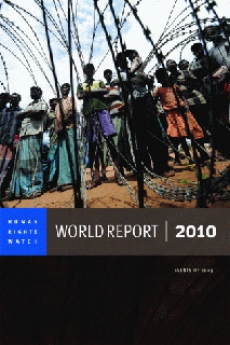| INTRODUCTION
The Abusers’ Reaction : Intensifying Attacks on Human Rights
Defenders, Organizations, and Institutions
By Kenneth Roth
Every government is at times tempted to violate human rights. To encourage governments to resist that temptation, the human rights movement seeks to raise the price of abuse—to shift the cost-benefit calculus behind a government’s actions.
The human rights movement’s ability to raise that price has grown substantially in recent years. Today, activists are capable of exposing abuses most anywhere in the world, shining an intense spotlight of shame on those responsible, rallying concerned governments and institutions to use their influence on behalf of victims, and in severe cases, persuading international prosecutors to bring abusers to justice. These are effective tools, and they have retained their power even as certain traditional allies wavered in their support for human rights. That effectiveness has spawned a reaction, and that reaction grew particularly intense in 2009. Certain abusive governments, sometimes working together, sometimes pursuing parallel tracks, are engaged in an intense round of attacks on human rights defenders, organizations, and institutions. The aim is to silence the messenger, to deflect the pressure, to lessen the cost of committing human rights violations. These attacks might be seen as an unwitting tribute to the human rights movement. If governments were not feeling the heat, they would not bother trying to smother the source. But the cynicism of their motives does not mitigate the danger. Under various pretexts, these governments are attacking the very foundations of the human rights movement.
The techniques vary from the subtle to the transparent, from the refined to the ruthless. In some cases, human rights activists—be they advocates, journalists, lawyers, petition-gatherers, or others who document and publicize abuses or
defend victims—have been harassed, detained, and sometimes killed. Organizations have been shut down or crippled. The tools used range from the classic police raid to the more novel use of regulatory constraints.
International institutions have also been targeted. The emergence of an international system of justice—especially the International Criminal Court—has been the focus of particular venom by government leaders who fear prosecution. The aim is
apparently to suppress any institution that is capable of penalizing those who violate human rights. The attacks are built on a series of arguments that have resonance but cannot ultimately be reconciled with the imperative of justice for the worst international crimes. In addition, the Human Rights Council, the United Nations’ foremost intergovernmental human rights body, has become victim of concerted efforts to undermine its potential by restricting voices that are independent of government control.
The emergence of a strong human rights movement has not, of course, meant the end of human rights abuses. Pressure sometimes works to mitigate or curb abuses, but at other times governments see such advantages to violating human
rights that they are willing to brave the cost. The trend, however, is that a growing number of governments hope to have their cake and eat it too—to violate human rights without paying a price. They hope to achieve that abuser’s paradise by subverting
the individuals and institutions that impose a cost for human rights abuse Governments, of course, have long been tempted to attack the bearer of bad news. There is a long, sordid history of human rights defenders being censored, imprisoned, “disappeared,” or killed. But now, as the human rights movement has grown more powerful and effective, the silence-the-messenger efforts of many governments have grown in subtlety and sophistication. Murders are committed deniably. Politically motivated prosecutions are disguised by common criminal charges. Censorship is accomplished through seemingly neutral regulatory regimes. Funding streams are blocked. As the UN special rapporteur on human rights defenders noted in August 2009, “the ways and means applied in certain countries in order to restrict the activities of human rights organizations are now even more widely used in all regions of the world.”
The perpetrators of these attacks are not limited to classic authoritarian governments such as Cuba and China. Democracies such as Sri Lanka have increased the pressure on local and international human rights groups that documented violations, as have governments that hold elections but fall short of democratic rule, such as Russia.
These efforts have yet to succeed in diminishing pressure from the human rights movement. Most human rights defenders accept the unintentional compliment behind the attacks and redouble their efforts. But the campaign to undermine human rights activism is nonetheless dangerous. By highlighting it in this year’s World Report, Human Rights Watch seeks to expose and help to reverse the trend.
A strong defense of human rights depends on the vitality of the human rights movement that is now under assault. We appeal to governmental supporters of human rights to help defend the defenders by identifying and countering these
reactionary efforts... | 